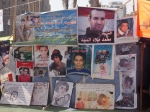Talking to travellers who’ve been to the Middle East, you often hear stories of the incredible hospitality people experience. Sadly as a tourist in Egypt there’s not much real hospitality to be had.
From the moment you arrive the guide books prepare you for it, but the constant pressure from salesmen, touts and scammers does get to you after a while. I can think of just 1 or 2 people who have approached us in the last 2 weeks without the end goal of trying to get money out of us somehow.
Many of these interactions are fairly straight-forward and easy to deal with – they go something like this.
(Walking down the street)
Man A: Hello my friends! Where are you from?
Us: Australia
Man A: Australia! Kangaroo! (or G’Day mate) I have been to Australia several times.
Us: That’s good
Man: So where are you going? Where are you staying? How long are you here for (one or all of these questions is possible)
Us: Just going for a walk / we’re staying nearby / we’re leaving soon
Man: I am just on my way home from work – let me show you where you can get a free tourist map (a friend’s shop where they are selling maps). The way ahead is closed.
Us: No thanks, we don’t want to buy anything
Man: Come with me my friends – this is just Egyptian hospitality
I can’t tell you how many times we’ve heard the phrase “Egyptian hospitality”. Sadly all of the dodgy touts that use that phrase, are going a long way to tarnishing the reputation of the entire country. “Egyptian hospitality” as they phrase it means either a) pressuring you to come into a shop to buy something you don’t want or b) warming you up to paying way too much for some random service.
As a tourist, Egyptian hospitality is really an oxymoron. It’s an interaction designed to rip you off in some way and hence have a bad experience and not want to return. Surely the opposite goal of what hospitality is meant to achieve?
It’s sad because Egypt is an amazing country. In every other country we’ve been to we’ve been able to have conversations with locals to learn about the culture and talk about our experiences. Here that’s only been possible here with hotel staff and tour guides. Which is a shame because it does make the whole tourist experience quite alienating.

Egyptian hospitality at Memphis. These guys jumped into my photo and that asked for “baksheesh” ( a tip) on the way out…..
Last week we visited the Pyramids of Giza which are incredible. Having touts and salesman follow you every step of the way really does taint the experience however. From people trying to sell you overpriced made-in-China trinkets, to guardians of the historical sites offering to take you (illegally) into sealed off tombs, to people giving you “presents” for which they later demand money for – it all gets a bit much.
I know a lot of people depend on tourism for their livelihood, and that tourist numbers have dwindled here since the Revolution. But trying to rip-off tourists is not the way the build tourism. It’s a short-term view that ultimately leads to less people coming to Egypt, and giving a bad experience to the ones that do.
Most tourists arrive now expecting they’re going to have to battle against scammers and touts – an expectation that makes you inadvertantly hostile towards people who may approach you without any bad intentions (though there are very few of those sadly).
Hopefully getting out of the main tourist areas over the next week will give us an opportunity to experience some real Egyptian hospitality….






















